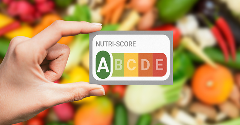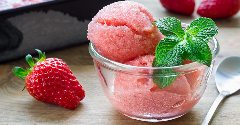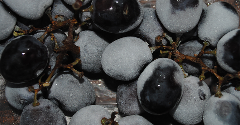News
Performance Positioning for Dairy Drinks Develops
15 Oct 2013A key trend in the food and drinks market in recent years has been the rising interest in high-protein lines, despite the fact that most European and North American consumers already get enough protein in their diets. This has been driven by increasing health concerns, boosted by the move of sports and performance products into […]

A key trend in the food and drinks market in recent years has been the rising interest in high-protein lines, despite the fact that most European and North American consumers already get enough protein in their diets. This has been driven by increasing health concerns, boosted by the move of sports and performance products into the mainstream, often targeted at the more generally active rather than athletes and sportsmen in particular. One of the major areas of focus in recent years has been the dairy sector, where protein is increasingly being used as a marketing platform linking benefits for muscles and bones with general associations with sporty and health-conscious lifestyles. Activity has focused on milk- and dairy-based protein drinks, particularly sports and recovery lines.
According to Innova Market Insights, fewer than 3% of global food and drinks launches recorded in the 12 months to the end of June 2013 were marketed on a high-protein or source-of-protein positioning, but this rises to over 7% in the US. Looking at recent new product activity in milks and other dairy drinks, however, data indicate that nearly 9.5% of launches globally used protein claims, although this was again skewed by the US, where getting on for a quarter of introductions were marketed as high in protein or a source of protein.
While the sports drinks market has tended to trail behind energy drinks in terms of growth in recent years, it has taken on new impetus in many major markets with rising interest in protein content and an increase in targeting more specific consumer groups, need states and exercise occasions. Whey and other dairy-based ingredients have seen rising use as added ingredients in the performance market, particularly for sports and recovery, where rising interest in protein beverages has seen the demand for whey as a high-added-value ingredient increase sharply. Rising interest has also reflected the development of more convenient ready-to-drink (RTD) performance products alongside the traditional powder mixes format, which has also helped the sector move on from its traditional core market of bodybuilders.
In the US, the markets for sports and protein drinks are reported to be transitioning from being separate categories to the emergence of one overall sports performance sector, and dairy ingredients and proteins, including milk, are playing a significant role in this. The market is still relatively undeveloped, but there are high levels of new product activity, with PepsiCo’s mainstream Gatorade, for example, now featuring high-protein Recover 03 recovery options in its G Series and G Series Pro portfolios. Other more mainstream products include lines such as Bolthouse Farms’ Perfectly Protein and Protein Plus ranges, as well as a raft of high-protein flavoured milk drinks, often marketed as dairy protein recovery beverages. These include brands such as Darigold’s Refuel and Shamrock Farms Rockin Refuel. The range of products available is continuing to grow, with Rockin Refuel, for example, extended in mid-2013 with three new targeted lines with specific formulations for Muscle Recovery, Intense Recovery and Muscle Building.

An early driver in the dairy performance sector was CytoSport, the largest athletic beverage producer in the US, launching its Muscle Milk powder for athletes and sportsmen as long ago as 2000, following this up with a ready-to-drink variant in 2004. Although originally targeting athletes, the Muscle Milk brand has increasingly been positioned as a supplement for the ‘everyday athlete’, appealing to the ‘hip to be fit’ crowd. It is also available in a Light variant targeted more specifically at women.
The market took another key step forward in its efforts to target more casual consumers and mass market channels in 2012, with soft drinks market leader Coca-Cola making its first direct investment in the US dairy industry when it partnered with Select Milk Producers to produce the Core Power high protein milkshake brand, positioned as a dairy-based sports recovery beverage and marketed as the first all-natural protein drink, containing 26-g of protein in each 11.5-ounce bottle. This was followed by a year-end announcement that Coca-Cola was investing in the brand itself to create a complementary value-added nutritional dairy portfolio, indicating its apparent interest in dairy-based soft drinks in general, and nutritional and performance lines in particular.

Across the Atlantic in the UK, the sports drinks market has always trailed the energy sector and remains underdeveloped, with many products still focusing on the specialist market rather than the mainstream, but there have still been initiatives aimed at developing dairy-based sports nutrition products for a wider audience, led by brands such as For Goodness Shakes, which has tapped into the opportunity for post-exercise products with a prepared shake made from UHT milk and targeted at the recovery sector of the sports nutrition market.
Mars Refuel flavoured milk range also focuses on recovery, but has a rather less overt sports positioning than For Goodness Shakes, trading also on the Mars Chocolate flavour heritage. It does claim to be full of milk goodness and that its protein:carbohydrate ratio of 1:4 aids fast muscle recovery, however. It also claims that everyone can benefit from the product, but that it is particularly popular amongst active people and sportsmen.

The UK’s leading nutritionally enriched milk drink Dunn’s River Nurishment from Enco has also increasingly targeted those with active lifestyles and now claims to be the country’s leading nutritionally-enriched milk brand, as well as the number six flavoured milk drink overall,. It is positioned as a nutritious calcium-, vitamin- and protein-enriched gap filler suitable for consumption on-the-go by those with busy, active lifestyles. A further development for the brand in 2012 was the launch of a new Nurishment Active variant, consisting of a bottled ready-to-drink nutritional milk drink marketed as high in protein and low in fat.
Xcel Milk, the UK’s first fresh-milk-based sports drink (For Goodness Shakes is made with UHT milk) appeared on the market in September 2012, using fresh milk from pedigree Jersey cows, with added vitamins, whey protein, sugar and flavourings. More recently still, in 2013, the Upbeat high protein dairy drink was launched under the Good Whey Co. banner by Volac, targeting mainstream consumers as well as sportspeople with its ‘powered by protein’ strapline. It is made with 77% whey protein from British milk, as well as fruit juice and natural fruit puree and is intended to open up a new category of protein drinks.

The benefits of milk in terms of nutrition, fat content, versatility and value for money make it an obvious candidate for the added-value nutritional drinks market, while a mounting body of evidence also supports its potential benefits in the sports and performance market, with potential benefits from both sectors. Whey and dairy based protein drinks are becoming increasingly popular in the mainstream market, as well as the more specialist performance sector, but there is also believed to be much more potential for future developments in the milk market itself.
Related news

UK to ban junk food TV advertisements before 9pm
3 Oct 2024
In a bid to reduce childhood obesity, the UK government has introduced a policy, coming into effect on 1 October 2025, banning junk food advertising on television before the 9pm watershed.
Read more
Which food and beverage brands made TIME’s Most Influential Companies list?
2 Oct 2024
Chickpea pasta, prebiotic sodas, food boxes, non-alcoholic beer, and a soil carbon marketplace are the specialties of the five food and beverage brands that earned a spot on TIME’s 2024 list.
Read more
New environmental food scoring standards emerge
30 Sep 2024
EIT Food and Foundation Earth collaborate to launch environmental food scoring for products entering the global supply chain.
Read more
Danone removes NutriScore from products
20 Sep 2024
Following an algorithm update that gives some of its sweetened drinks a worse score, Danone has removed the front-of-pack label, NutriScore, from all of its products – putting profit before public health, say campaigners.
Read more
Nestlé develops a new fat reduction method for dairy ingredients
26 Aug 2024
A Brazil-based Nestlé research and development team has developed a way to reduce the fat in milk powder by as much as 60%, without impacting the key characteristics that consumers enjoy.
Read more
Better Juice expands its range to sorbets
16 Aug 2024
Food tech startup Better Juice has developed a technology to reduce the sugar content in fruit sorbets. The process retains the natural vitamins, minerals, and flavours of fruit, while offering manufacturers an easy-to-implement and scalable solution t...
Read more
German study reveals high sugar, fat, and salt levels in children's foods
13 Aug 2024
The food industry is making slow progress in reducing the high levels of sugar, fat, and salt in German food and beverage products marketed to children, according to the Max Rubner Institute (MRI).
Read more
Swedish court overturns prohibition on winery’s use of imported frozen grapes
12 Aug 2024
Swedish company Drood Winery has successfully challenged the Swedish Food Agency’s decision to prohibit the production and sale of their product made from frozen grapes imported from Iran.
Read more
Paris Olympics: Food and beverage brands champion health, fun, and sustainability
5 Aug 2024
Food and beverage brands are aligning with the Paris Olympics 2024 Food Vision, which emphasises sustainability, local sourcing, and plant-based diets.
Read more
The coffee supply chain is failing farmers, says Solidaridad
30 Jul 2024
The coffee industry’s economic model means its profits do not reach farmers, despite there being enough value to be shared all along the supply chain, according to a new report by Solidaridad Network and IDH.
Read more